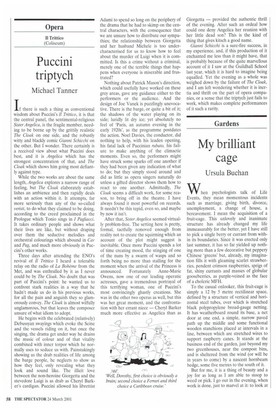Opera
II Trittico (Coliseum)
Puccini triptych
Michael Tanner
If there is such a thing as conventional wisdom about Puccini's II Trittico, it is that the central panel, the sentimental-religious Sister Angelica, is the fragile member, needing to be borne up by the grittily realistic The Cloak on one side, and the robustly witty and blackly comic Gianni Schicchi on the other. But I wonder. There certainly is a received view about what Puccini does best, and it is Angelica which has the strongest concentration of that, and The Cloak which shows him going most defiantly against type.
While the two works are about the same length, Angelica explores a narrow range of feeling, but The Cloak elaborately establishes an ambience and then rapidly deals with an action within it. It attempts, far more seriously than any of the so-called veristi, to do what they claimed to be doing, according to the creed proclaimed in the Prologue which Tonio sings in I Pagliacci. It takes ordinary people and shows what their lives are like, but without draping over them the seductive melodies and orchestral colourings which abound in Cav and Pag, and much more obviously in Puccini's other works.
Three days after attending the ENO's revival of II Trittico I heard a tolerable relay on the radio of La Boheme from the Met, and was enthralled by it as I never could be by The Cloak. No doubt that was part of Puccini's point: he wanted us to confront stark realities in a way that he hadn't made us do in his previous works, for all the pain and anguish they so glamorously convey. The Cloak is almost wilfully unglamorous, but that leaves the composer unsure of what idiom to adopt.
He begins with the celebrated (relatively) Debussyan swayings which evoke the Seine and the vessels riding on it, but once the singing, the drama get under way he drains the music of colour and of that vitality combined with inner torpor which he normally uses to seduce us with. Painstakingly showing us the drab realities of life among the barge people, he neglects to show us how they feel, only revealing what they look and sound like. The illicit love between the non-heroine Giorgetta and the stevedore Luigi is as drab as Cheryl Barker's cardigan. Puccini allowed his librettist
Adami to spend so long on the periphery of the drama that he had to skimp on the central characters, with the consequence that we are unsure how to distribute our sympathies; the relationship between Giorgetta and her husband Michele is too undercharacterised for us to know how to feel about the murder of Luigi when it is committed. Is this a crime without a criminal, merely one of the terrible things that happens when everyone is miserable and frustrated?
Nothing about Patrick Mason's direction, which could usefully have worked on these grey areas, gave any guidance either to the performers or the audience. And the design of Joe Vanek is puzzlingly unevocative. There is the barge, or quite a bit of it; the shadows of the water playing on its side; luridly lit dry ice; yet absolutely no feel of 'Paris, an autumn evening in the early 1920s', as the programme postdates the action. Noel Davies, the conductor, did nothing to help, with his leaden opening, his fatal lack of Puccinian rubato, his failure to make anything of the climactic moments. Even so, the performers might have struck some sparks off one another if they had been given any indication of what to do; but they simply stood around and did as little as opera singers naturally do unless a gifted director shows them how to react to one another, Admittedly, The Cloak seems a difficult work, for some reason, to bring off in the theatre. I have always found it most powerful on records. It needn't be this tepid, even so, and maybe by now it isn't.
After that, Sister Angelica seemed virtually problem-free. The setting here is pretty, formal, tactfully removed enough from reality not to create the squirming which an account of the plot might suggest is inevitable. Once more Puccini spends a lot of time creating mood, the stinging of one of the nuns by a swarm of wasps and so forth being no more than stalling for the moment when the arrival of the Princess is announced. Fortunately Anne-Marie Owens, now one of our leading operatic actresses, gave a tremendous portrayal of this terrifying woman, one of Puccini's most convincingly ghastly creations. She was in the other two operas as well, but this was her great moment, and the confrontation with her errant niece — Cheryl Barker much more effective as Angelica than as Giorgetta — provided the authentic thrill of the evening. After such an ordeal how could one deny Angelica her reunion with her little dead son? This is the kind of thing that gives kitsch a good name.
Gianni Schicchi is a sure-fire success, in my experience, and, if this production of it enchanted me less than it might have, that is probably because of the quite marvellous account of it I saw at the Guildhall School last year, which it is hard to imagine being equalled. Yet the evening as a whole was weighed down by the failure of The Cloak, and I am left wondering whether it is inertia and thrift on the part of opera companies, or a sense that the triptych just fails to work, which makes complete performances of it such a rarity.














































































 Previous page
Previous page